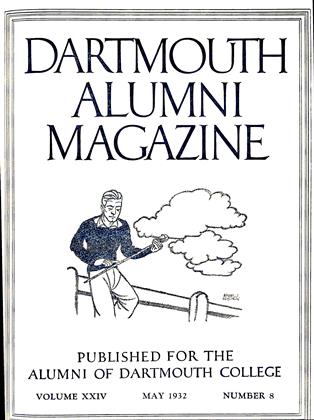THAT member of the class of 1900 (let us say) who decided a few years ago to go to the Harvard-Dartmouth game was not heartbroken to find that a seat had been alloted him in the vicinity of the 10-yard line. "At least I'll see the game, maybe a few good plays will be down at my end. And everybody will be there. Not so bad." Much joshing at the game—all to the general effect that the class certainly could pick good seats, better luck next year, anyway. The next season and Stadium tickets arrived in due course. Seats on the goal line didn't seem fair. Give it another try. And the next fall he was right there again. He sends a protest to Hanover. But the reply, if any, seems entirely inadequate.
Then comes the time—there seems to be at least one in every Dartmouth man's life—when the application for Harvard tickets is sent off a few hours late. It is forgotten by the applicant. No word comes from Hanover until the tickets reach him and the section number is in higher figures than he thought existed. All due to the late application, of course. We all realize that the seats between the goal lines are limited in number. And applications have to be in on time. But if we could get a good break on tickets once in awhile, if we knew how they are assigned and who sits on the 50-yard line and why, if protests seemed to do any good—all questions that are asked countless times as envelopes are eagerly opened and the disappointment of poor seats is faced again.
The Athletic Council has not been blind. It has set up an efficient system of ticket allotment and has hewed to the line of it. The system has been administered to the best of the football ticket department's abilities; but to those in charge of this work and to the Athletic Council it has appeared that something is lacking, that there may be some method so far undiscovered, conducive to a smoother and more satisfactory functioning of ticket allotment. With all of this in mind the Council recently asked the President of the College to survey the question of equitable distribution of tickets. The committee was promptly selected. The President has drafted its personnel from all of the various interests involved. The members have proven their capabilities in working for the best welfare of the College in other capacities related to alumni activity. The committee's first meetings last month, as reported in News of the College in this issue, indicate that no time is being lost in starting the survey. A conclusive report can hardly be expected within a year's time owing to its comprehensive nature; the coming season will furnish an opportunity for observation of the present system and its difficulties.
Once again the College Administration evidences its solicitude for the alumni. Football tickets may not be a crucial problem. But their major importance at least once during the year merits the full consideration that the question will receive.
 View Full Issue
View Full Issue
More From This Issue
-
 Class Notes
Class NotesCLASS OF 1929
May 1932 By Frederick William andres -
 Article
ArticleDirectory of Alumni Associations and Classes
May 1932 -
 Lettter from the Editor
Lettter from the EditorPublic or Private Schools: A Letter to the Editor
May 1932 By Louis P. Benezet -
 Article
ArticleA Student in the Early Eighteen Hundreds
May 1932 By Mary B. Slade -
 Class Notes
Class NotesCLASS OF 1905
May 1932 By Arthur E. McClary -
 Article
ArticleLetch worth Village—A Home for Mental Defectives
May 1932 By Charles S. Little, M.D.







